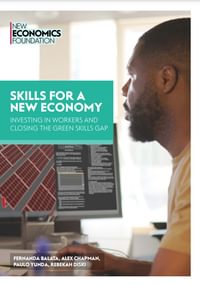Skills for a new economy
Investing in workers and closing the green skills gap
28 February 2023
Central to the net zero and levelling up challenges is the development of people’s education and skills. Jobs and skills are two sides of the same coin – you can’t solve one without addressing the other. Yet, the UK has a significant, albeit poorly understood, green skills gap. Sectors of huge importance for the transition to a net-zero economy, such as construction and manufacturing, are struggling with skilled workforce shortages, and there are still gaps in knowledge across the economy, including the skills and jobs needed to transform and sustain our food, transport, and care systems.
The potential for job protection and creation across the economy is not being achieved. There is still little and poor integration between skills initiatives and the needs of the green transition. Recent examples of policy failures, like the Green Homes Grant, have exposed the lack of a skilled workforce and have had a material impact on workers and businesses. Similarly, the neglect of the care sector, and the offshoring of contracts in wind energy and bus manufacturing, have offshored jobs and skills that could well have been retained in the UK. Policy interventions by the UK government, including the Apprenticeship Levy and the Lifetime Skills Guarantee, have been insufficient so far in addressing the general skills deficit, let alone supporting the workforce to adapt to the needs of a low-carbon economy. Distinct policy and investment choices by the Welsh government, for example, have reflected a better performance by Welsh authorities in upskilling its population.
Across the UK, the average worker is currently below the skill level needed to access emerging green jobs. All regions of the country, except London, have an average skill level below the green jobs average, with the lowest average skill level found in the North and the Midlands. New Economics Foundation (NEF) analysis estimates that the average worker would need between six and 18 months of additional work-related training to access existing green jobs, either undertaken on the job or in an educational institution. This is set against a backdrop of declining levels of adult participation in education and skills training over the past decade. We need to address key barriers to learning, notably time and cost barriers. But there are also less tangible and more dispositional – yet important – barriers, such as a person’s experience of education and lack of confidence as a learner.
Delivering a ‘just transition’ requires a collective effort and social dialogue. Yet, the UK government’s current approach to the skills transition leaves workers’ voices out of the process. Compared to other advanced economies, and indeed to other nations within the UK, England has relatively limited formal arrangements for social partnership in the skills system. Only 13% of organisations in the UK currently have a collective training agreement. In examples where social partners are extensively involved in the training system, employers tend to invest more and deliver more equal access to training.
The challenge of making the skills transition fair is urgent. The need to rapidly decarbonise the economy has been compounded by the cost of living scandal, set against the ongoing recovery from a pandemic, the uncertainties of Brexit, and changes in the world of work due to automation. Considering these different factors, the groups most at risk of being left behind by an unmanaged transition are, predictably, workers in low-skilled, low-paid jobs; in precarious jobs, including zero-hour contracts; and in high or very high carbon-emitting jobs.
Without a bold plan for skills, levelling up and net zero will be in direct tension with one another. We outline three principles for reform to put us on a path of delivering a skills transition that is fair – meaning, tackling barriers to retraining and upskilling so that no worker is left behind – and helps close the green skills gap.
- A skills transition through social partnership. Set arrangements for social partnership in the skills system, that elevate workers’ voices. This could begin through a reformed model of the official Local Skills Improvement Plans.
- Targeted policy and investment to address key barriers to learning. We need well-funded and supportive skills and employment programmes that successfully address the twin challenges of upskilling and income security. This needs to be complemented with more holistic approaches to address less-tangible barriers to learning. The UK government can start by reversing the cut to the Union Learning Fund in England.
- A national skills and labour market strategy. The UK government should bring together social partners to develop an overarching assessment of the varying degrees of green skills needs and green job opportunities across the whole economy. A national skill and labour market strategy would support local and regional efforts in linking green skills to green jobs more effectively, as local areas maximise the opportunities for job creation within their geography and build on their assets. Furthermore, most workers are attracted to jobs that produce a tangible sense of social value that is a distinct but often invisible component of job quality. Developing green skills in the workforce cannot be detached from ensuring that green jobs are good jobs.
Topics Climate change Environment







